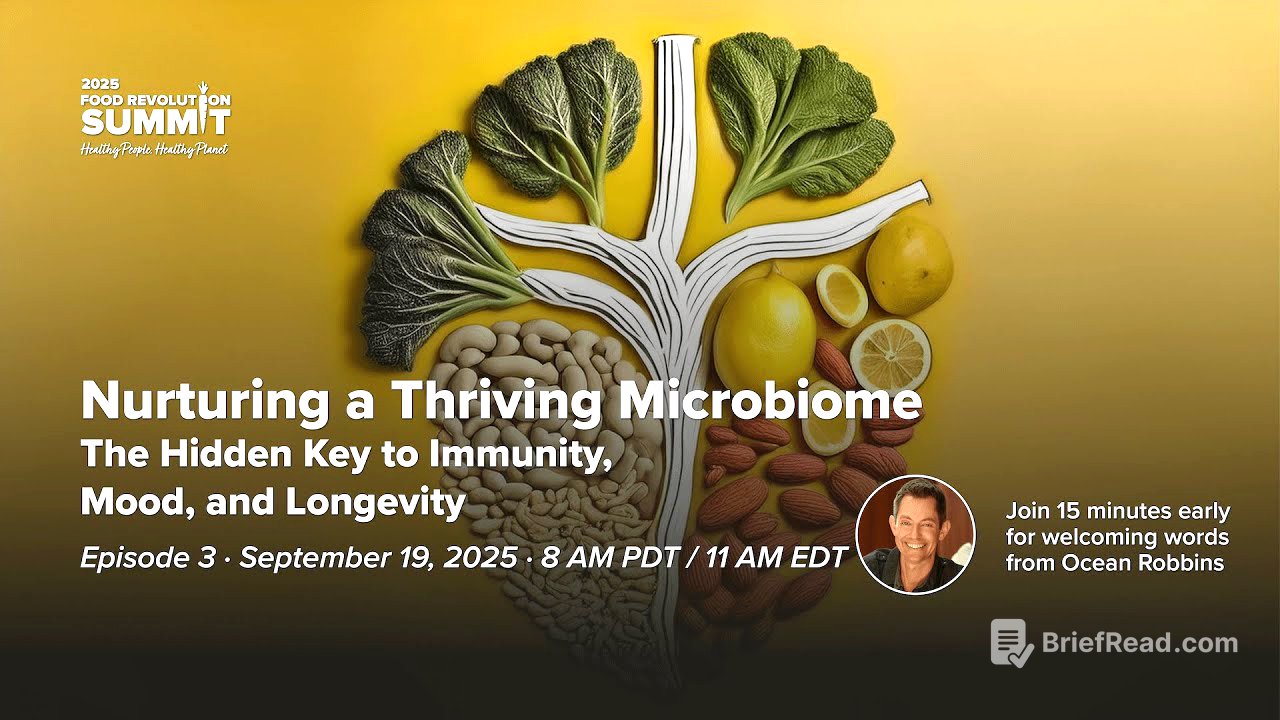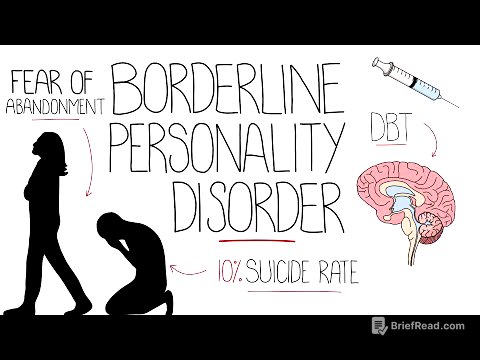TLDR;
This YouTube video transcript is a summary of Day 3 of the Food Revolution Summit docuseries, focusing on nurturing a thriving microbiome for improved immunity, mood, and longevity. It highlights the importance of gut health, the impact of food choices on the microbiome, and practical steps to improve gut health through diet and lifestyle.
- Gut health is essential for overall wellness, affecting digestion, immunity, mental health, and energy levels.
- The gut microbiome, consisting of trillions of microbes, plays a key role in health, influencing everything from heart health to the immune system.
- Diet and lifestyle choices, including consuming whole foods, fiber-rich foods, and fermented foods, can positively impact the gut microbiome.
Introduction to the Food Revolution Summit Day 3 [0:00]
Ocean Robbins introduces Day 3 of the Food Revolution Summit docuseries, emphasizing the importance of nurturing a thriving microbiome for immunity, mood, and longevity. The episode explores how to improve gut health, the significance of microbial diversity, and the latest research on fermented foods, sweeteners, and gut-healing diets. Key topics include TMAO, leaky gut, short-chain fatty acids, and gut-friendly foods. The goal is to transform health from the inside out, encouraging viewers to share their experiences and insights in the comment section.
The Power of Community and a Healthier Food Future [0:11]
Ocean Robbins highlights the importance of community in overcoming the challenges of a toxic food culture. He shares testimonials from viewers who have benefited from the summit, including revelations about soy's health benefits and the increasing recognition of food's role in managing blood pressure by mainstream doctors. Initiatives like Produce Prescriptions, where doctors prescribe fruits and vegetables, are gaining traction. The American Medical Association is also increasingly promoting diet and lifestyle as solutions to the healthcare crisis.
Practical Tips and Insights from Viewers [4:13]
Ocean Robbins shares practical tips, such as sprouting and pressure cooking soybeans to increase their bioavailability. He addresses viewer questions, including whether flax and chia seeds need to be ground for optimal absorption, advising that flax seeds should be ground, soaked, sprouted, or toasted to maximize nutrient absorption. He also acknowledges the challenges of fibromyalgia and suggests holistic strategies like a whole foods plant-rich diet, gentle movement, quality sleep, and stress reduction techniques.
Episode 3 Introduction: Nurturing a Thriving Microbiome [16:39]
The episode officially begins with an introduction to the gut microbiome and its profound connection to overall wellness. Experts emphasize that gut health is essential for digestion, immunity, mental health, and energy levels, with some even referring to the gut as the "second brain." An imbalanced microbiome is linked to inflammation, chronic diseases, mood disorders, and compromised immune function. The good news is that gut health can be influenced daily through practical steps.
The Gut Microbiome: A Historical Perspective [19:53]
Experts discuss the origins and evolution of the gut microbiome, noting that the microbes in our gut are the ancestors of Earth's first living organisms, dating back 2 to 3 billion years. The gut microbiome begins to develop at birth through contact with the mother's body, breast milk, and the environment. The gastrointestinal tract is divided into upper, middle, and lower sections, each playing a critical role in digestion and nutrient absorption. The colon is where fermentation occurs, producing important metabolites like short-chain fatty acids that support gut lining and immune system health.
The Interconnectedness of Gut Health and Overall Health [24:21]
The discussion emphasizes the interconnectedness of the body's systems, highlighting that digestive function significantly impacts overall health, including the immune system and metabolic health. Modern medicine is often siloed, but there's a growing recognition that organ systems are related, particularly through the gut. Integrative gastroenterology focuses on the profound implications of gut health for the brain, immune system, heart, and lungs.
The Gut-Heart Connection and TMAO [26:12]
The link between gut health and heart health is explored, introducing TMAO (trimethylamine N-oxide) as a biomarker for predicting heart disease risk. TMAO is produced by certain gut microbes when consuming red meat, choline (found in egg yolks), and L-carnitine. High levels of TMAO in the blood can damage blood vessels and promote atherosclerosis. Vegans typically have lower TMAO levels and do not need to worry about this factor.
The Impact of the Standard American Diet on Gut Health [29:33]
The standard American diet, high in meat, dairy, saturated fats, sugar, and artificial additives, and low in fiber and plant diversity, is identified as detrimental to gut health. This diet increases the risk of bowel cancer, diverticular disease, acid reflux, constipation, Crohn's disease, and ulcerative colitis. Meat consumption, in particular, is linked to the production of TMAO and carcinogenic secondary bile acids.
The Downside of Artificial Sweeteners and NSAIDs [33:28]
The discussion shifts to the negative impacts of artificial sweeteners and non-steroidal anti-inflammatory drugs (NSAIDs) on gut health. Artificial sweeteners can trigger insulin release and disrupt gut bacteria, potentially leading to diabetes and obesity. NSAIDs, while helpful for managing pain, can cause gastrointestinal bleeding, ulcers, and increased intestinal permeability (leaky gut) with chronic use.
The Hygiene Hypothesis and Pesticide Exposure [41:00]
The "hygiene hypothesis" is introduced, suggesting that excessive cleanliness may not be beneficial for building a strong immune system. Exposure to some germs is essential for training the immune system not to overreact later in life. Pesticide exposure, particularly glyphosate, can disrupt the gut's microbiome balance. Choosing organically grown foods, especially corn, soy, oats, and wheat, can minimize exposure to glyphosate.
Lifestyle Factors: Gardening and Exercise [45:38]
Lifestyle factors that promote a healthy gut are explored, including gardening and exercise. Gardening exposes individuals to a rich variety of microbes, helping to diversify the microbiome and strengthen the immune system. Physical exercise also builds a healthier gut microbiome by increasing healthy fiber-loving microbes and improving short-chain fatty acid production.
Fecal Microbial Transplants (FMT) and Dietary Interventions [49:04]
Fecal microbial transplants (FMT) are discussed as a procedure where healthy microbes from one person's gut are implanted into another's. While FMT has proven beneficial for recurrent C. difficile infections, studies on using FMT for conditions like metabolic syndrome and ulcerative colitis have been disappointing. Dietary changes alone have shown more promising results, emphasizing the importance of food in shaping gut health.
The Importance of Fiber and Prebiotic Sodas [53:22]
Fiber is highlighted as a cornerstone of a healthy gut, feeding the good bacteria that our guts and health depend on. Prebiotic fiber is found in various fiber-rich foods, and a whole food plant-based diet provides all the prebiotics needed. Prebiotic sodas, while potentially a step in the right direction for those who like fizzy drinks, should not replace whole fiber-rich foods.
Probiotics vs. Fermented Foods [58:21]
The value of probiotic supplements is questioned, with experts stating that there is no reason for most people to spend money on probiotics, as research has not shown significant health benefits. Fermented foods, on the other hand, are praised as "rock stars" for gut health because they contain prebiotics, probiotics, and postbiotics, providing a powerhouse combination of benefits.
The Role of Fiber and Plant Diversity in Gut Health [1:04:41]
The importance of a high-fiber diet is emphasized, with a focus on whole foods, vegetables, grains, and legumes. Plant diversity is key, with studies showing that individuals consuming more than 30 different plants per week have certain healthful bacteria in their gut microbiomes that those consuming fewer than 10 plants per week do not have. Plant-based diets, on average, lead to healthier gut microbiomes.
Types of Fiber and Processed Plant-Based Foods [1:11:42]
Different kinds of fiber, including soluble fiber, insoluble fiber, and resistant starch, are discussed, each playing a unique role in gut health. The proliferation of processed plant-based foods is a concern, as these foods may be made from food-derived ingredients but are not necessarily healthy. The importance of eating whole foods that have not undergone prolonged stops in a factory is emphasized.
Hydration and the Gut Microbiome [1:17:26]
Staying hydrated is critical for a healthy gut, helping to keep the digestive system moving smoothly and allowing fiber to do its job effectively. Water helps the body flush out waste and toxins. Thin liquids can help clear digestive pipes, and the colon reabsorbs fluid back into the bloodstream, contributing to overall hydration.
Making Positive Changes and Addressing Digestive Issues [1:19:37]
Positive changes in gut health can happen quickly, with the gut microbiome starting to shift in a matter of hours and real changes setting in within weeks. Simple swaps, like whole-grain bread instead of white bread, can add more nutrients and prebiotic fiber. As fiber intake increases, some people may experience gas or bloating, requiring a gradual increase in fiber intake.
Low FODMAP Diets and the Gut-Brain Axis [1:20:51]
Low FODMAP diets are discussed as a common treatment for IBS and other digestive problems. While they can reduce symptoms in the short term, long-term outcomes are concerning, as they can negatively affect the gut microbiome and reduce overall dietary quality. Stress management and calming the gut-brain axis are also important for addressing unexplained GI symptoms.
Leaky Gut Syndrome and Short Chain Fatty Acids [1:29:37]
Leaky gut syndrome is explained as a condition where the gut lining becomes more permeable, allowing toxins and bacteria to enter the bloodstream. Eating a diet rich in fiber helps to heal a leaky gut by feeding the bacteria in the gut and producing short-chain fatty acids like butyrate, which keep the gut healthy.
Conclusion: Simple Steps for Gut Health [1:32:38]
The episode concludes by summarizing the key steps for improving gut health: eating more whole fiber-rich foods, incorporating fermented foods, staying hydrated, engaging in regular exercise, and connecting with nature. Listening to your gut and paying attention to its feedback is also crucial.
Viewer Questions and Community Engagement [1:36:13]
Ocean Robbins addresses viewer questions, including the safety of apple cider vinegar, the healthiness of stevia, and how to incorporate carbs back into a diet after keto. He also discusses the impact of low-dose aspirin on the microbiome and the effects of fasting on gut health. He shares success stories from viewers who have improved their health through dietary changes and encourages viewers to continue engaging in the comment section and on social media.
Resources and Recipes of the Day [2:01:37]
Ocean Robbins introduces the recipes of the day, including digestive wellness juice, pumpkin oat bites, and smoky blackeyed pea, butternut squash, and collard greens soup. He also highlights the expert interviews available and encourages viewers to check out the empowerment package for access to the entire summit and bonus content.
Preview of Episode 4: Conquering Heart Disease [2:07:17]
A preview of Episode 4, "Conquering Heart Disease: Transforming Cardiovascular Health with Science and Action," is shown, highlighting the importance of diet and lifestyle in preventing and even reversing cardiovascular disease. The episode will explore the latest research and empower viewers to make lasting and life-changing choices for their heart health.









